Honors
-
 Order of Friendship of Russia, 1992. [10]
Order of Friendship of Russia, 1992. [10] -
 Order of Merit of Ukraine, 3rd Class, 2010. [11]
Order of Merit of Ukraine, 3rd Class, 2010. [11] -
 Order of the Rising Sun, 2nd Class, Gold and Silver Star, 2012. [12]
Order of the Rising Sun, 2nd Class, Gold and Silver Star, 2012. [12]
Chen Haosu | |
|---|---|
陈昊苏 | |
| Chairperson of the Chinese People's Association for Friendship with Foreign Countries | |
| In office 2000–2011 | |
| Preceded by | Qi Huaiyuan |
| Succeeded by | Li Xiaolin |
| Personal details | |
| Born | May 1942 (age 81) Funing County,Jiangsu |
| Nationality | Chinese |
| Political party | Chinese Communist Party since 1965 [1] |
| Spouse | Qin Zhao (秦昭) |
| Parent(s) | Chen Yi,Zhang Qian (张茜) [2] |
| Relatives | Chen Xiaolu (brother) |
| Education | University of Science and Technology of China ( BSc ) |
| Alma mater | |
| Occupation | Politician, poet |
Chen Haosu (born 1942) is a Chinese poet and politician. He served as Chairman of the Chinese People's Association for Friendship with Foreign Countries from 2000 to 2011. [3] He is also President of the China International Friendship Cities Association, China-Russia Friendship Association and China-EU Association. [1] [4]
Born in May 1942, Chen is son of the late Marshal and Foreign Minister Chen Yi. [5] He graduated from the University of Science and Technology of China with a Bachelor's Degree in Science [4] [6] and served successively as Secretary of the China Youth League Central Committee, [4] [7] [8] Chinese Communist Party Deputy Committee Secretary of Fengtai, [6] Vice Mayor for the Beijing Municipality, [1] [4] Vice Minister of the Film and Television Bureau [9] and member of the 9th Chinese People's Political Consultative Conference National Committee. [4]
Apart from his political involvement, Chen used to be researcher at the People's Liberation Army Academy of Military Sciences. [1] He now serves in the Global Executive Committee and as Asia-Pacific President of the United Cities and Local Governments. [6]
He is also a published poet. [1]
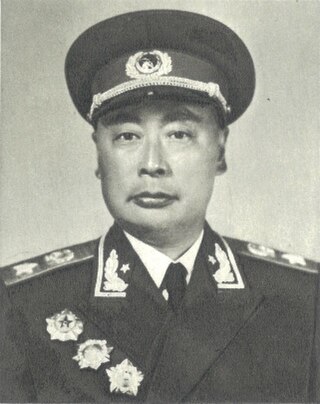
Chen Yi was a Chinese communist military commander and politician. He served as Mayor of Shanghai from 1949 to 1958 and as Foreign Minister of China from 1958 to 1972.

Albert Chen Hung-yee is a Hong Kong legal scholar, specialising in constitutional law. He is the current Cheng Chan Lan Yue Professor in Constitutional Law and the Chair of Constitutional Law at the Faculty of Law of the University of Hong Kong, and was the Dean of the faculty from 1996 to 2002.
Lu Yi is a Chinese actor and pop singer.
The 15th Central Committee of the Chinese Communist Party was in session from 1997 to 2002. The 14th Central Committee preceded it. It was followed by the 16th Central Committee of the Chinese Communist Party. This was the first Central Committee that current CCP general secretary Xi Jinping was elected to, as an alternative member.
The 14th Central Committee of the Chinese Communist Party was in session from 1992 to 1997. It held seven plenary sessions. It was preceded by the 13th Central Committee. It was elected by the 14th National Congress of the Chinese Communist Party and in turn elected the 14th Politburo of the Chinese Communist Party.
The 11th Central Committee of the Chinese Communist Party was in a five-year session from 1977 to 1982. The 10th Central Committee of the Chinese Communist Party preceded it. It held seven plenary sessions in the five-year period. It was formally succeeded by the 12th Central Committee of the Chinese Communist Party.
The 10th Central Committee of the Chinese Communist Party was in session from 1973 to 1977. It was preceded by the 9th Central Committee of the Chinese Communist Party. It held three plenary sessions in the four-year period. It was formally succeeded by the 11th Central Committee of the Chinese Communist Party.
The 9th Central Committee of the Chinese Communist Party was in session from 1969 to 1973. It was preceded by the 8th Central Committee of the Chinese Communist Party. It was the second central committee in session during the Chinese Cultural Revolution. Even amidst partial cultural disintegration, it was succeeded by the 10th Central Committee of the Chinese Communist Party. It held two plenary sessions in the 4-year period.
The 7th Central Committee of the Chinese Communist Party was in session from 1945 to 1956. It was a product of the convening of the 7th National Congress of the Chinese Communist Party. It held six plenary sessions in this 11-year period. It began in June 1945, before the end of the Second Sino-Japanese War, and the resumption of the Chinese Civil War. This committee would be succeeded by the 8th Central Committee.
The Politics of Ningxia Autonomous Region in the People's Republic of China is structured in a dual party-government system like all other governing institutions in mainland China.

Beijing No.4 High School is a public secondary school in Xicheng, Beijing, China.
The Politics of Fujian Province in the People's Republic of China is structured in a dual party-government system like all other governing institutions in mainland China.
The Chinese People's Association for Friendship with Foreign Countries is one of the major foreign affairs organizations of the People's Republic of China. The organization is officially termed as a "people's organization" and manages China's sister city relationships. Its stated aim is to promote friendship and mutual understanding between the Chinese people and foreign nations but observers have pointed out that it functions as a front organization in the united front system used to influence and co-opt elites to promote the interests of the Chinese Communist Party (CCP) while downplaying its association with the CCP.
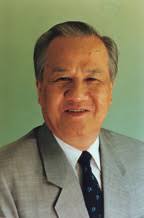
Chen Jinhua was a Chinese politician. Chen joined the Chinese Communist Party (CCP) in February 1949 and studied at Renmin University of China from 1953 to 1955 and from 1960 to 1962. From the 1950s through the 1970s, he served in positions of increasing responsibility in China's former Ministry of Textile Industry and Ministry of Light Industry. From 1977 to 1983, Chen served on the Standing Committee of the Shanghai Municipal People's Congress, as well as deputy secretary of the Shanghai CCP Committee. From 1983 to 1990, he served as the general manager and CCP committee secretary of state-owned oil company Sinopec.
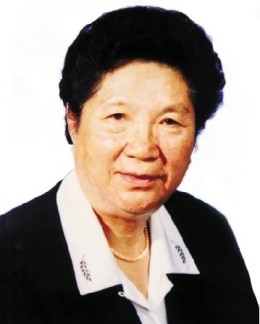
Chen Muhua was a Chinese Communist revolutionary and politician who served as Vice Premier, State Councilor, Minister of Foreign Economic Relations and Trade, Commissioner of the National Family Planning Commission, Governor of the People's Bank of China, and Chairwoman of the All-China Women's Federation. She was an alternate member of the Politburo of the Chinese Communist Party, one of the few women to have entered China's top decision-making body.
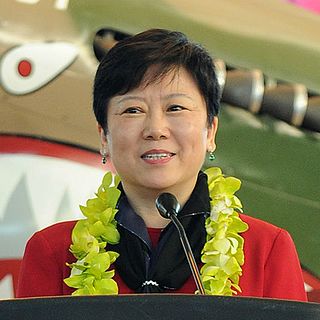
Li Xiaolin is a Chinese politician who served as party secretary and chairperson of the Chinese People's Association for Friendship with Foreign Countries. She is also a member of the 12th National Committee of the Chinese People's Political Consultative Conference.
Chen Guangyi was a Chinese politician. He served as Governor of Gansu Province, Communist Party Secretary of Fujian Province, and Director of the Civil Aviation Administration of China. Under his leadership, Fujian achieved record economic growth that exceeded the national rate in the 20th century.
Chen Xiaolu was a Chinese military officer and businessman. As a son of Marshal Chen Yi, he was one of China's most prominent princelings, or children of high officials. He held the rank of colonel when he quit his military and government posts in 1992 and entered business. His military background and princeling status helped his businesses expand to great sizes. He was an early director of privately held Anbang, which grew into an insurance giant. In 2013, he made national headlines when he publicly confessed and apologized for torturing and persecuting his teachers during the Cultural Revolution. He has been called the "conscience" of princelings.
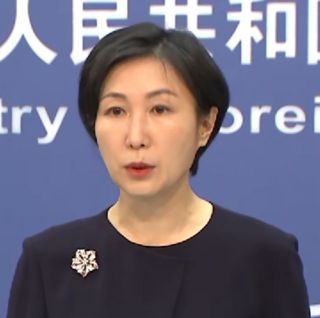
Mao Ning is a Chinese diplomat. As an official of the Chinese Communist Party, she has been serving as the spokeswoman and deputy director of information at the Chinese Ministry of Foreign Affairs since September 2022.